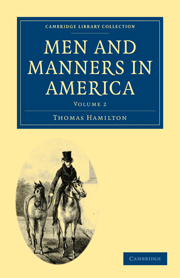CHAP. III - Washington
Published online by Cambridge University Press: 29 August 2010
Summary
Though the soil of the United States may be considered ungenial for the growth of philosophy and literature, it would certainly appear to be very happily adapted for the cultivation of eloquence. It is one effect of free institutions, that in multiplying the depositories of political power, they render the faculty of persuasion a necessary element on which successful ambition must rest for support. Under a despotic government there is “ ample room and verge enough” for no eloquence but that of the pulpit. There exists little community of sentiment between the governors and the governed, and habits of passive obedience are incompatible with that buoyancy of thought and feeling with which true eloquence is inseparably connected. But in a republic the whole interests of man, individually and collectively, become matter of unrestricted discussion, and afford vantage-ground for the orator. Earth, air, ocean, and the living myriads that inhabit them, and that wider world of thought and consciousness existing in the human breast, are all comprised within the limits of his dominion, and obey the impulse of his genius.
In America the power of persuasion constitutes the only lever of political advancement. In England, though the field for the exercise of this talent be very great, yet rank, wealth, family connexions, hereditary claims, and a thousand other influences must be taken into account, in reckoning the ordinary elements of successful ambition. How powerful—whether for good or evil I shall not enquire—many of these are, is well known, but none of them exist in the United States.
- Type
- Chapter
- Information
- Men and Manners in America , pp. 71 - 126Publisher: Cambridge University PressPrint publication year: 2009First published in: 1833

